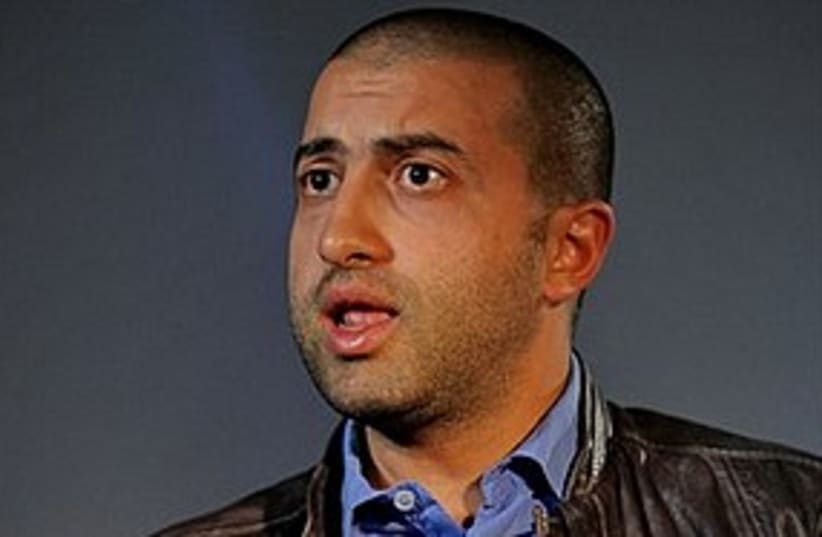Homeland Security: Yousef is a terrorist dangerHomeland Security called Yousef a terrorist danger when it denied asylum in February 2009 and, in court documents provided to The Associated Press by Yousef's attorney, says he "discusses his extensive involvement with Hamas in great detail" in his recent memoir. It cites a passage in which Yousef identifies five suspects in a 2001 suicide bombing to a Shin Bet official and admits that he drove them to safe houses. It was not more specific in its pre-hearing briefing about the threat he may pose to the U.S.Yousef says his intelligence work for Israel required him to do anything he could to learn about Hamas and that neither he nor Israel knew they were suspects in the suicide bombing when he gave them rides."Yes, while working for Israeli intelligence, I posed as a terrorist," he wrote. "Yes, I carried a gun. Yes, I was in terrorist meetings with Yassir Arafat, my father and other Hamas leaders. It was part of my job."Israel has not commented on Yousef's claims, though members of the Knesset Foreign Affairs and Defense Committee wrote him this month to thank him and recognize his work for Shin Bet.His attorney, Steven Seick, said Shin Bet will not have a representative address the immigration judge but that the now-retired officer who recruited and supervised him, Gonen Ben-Itzhak, is expected to testify.Ben-Itzhak wrote that hundreds of Israelis and Palestinians owe their lives to Yousef for preventing violence. The officer is identified only by a pseudonym, Loai, in court documents.The government does not plan to call witnesses, Seick said.Yousef's attorney wanted an FBI agent to support Yousef's claim that he gave information about Hamas and terrorism. The FBI refused but said it would not object if Yousef testifies he met twice with agency personnel.In his book, Yousef describes growing up admiring Hamas and hating Israel, leading him to buy a couple machine guns and a handgun in 1996. He said the guns didn't work and that he was arrested by Israeli forces before he killed anyone.Yousef says he started working with Shin Bet after witnessing Hamas brutalities in prison that left him disillusioned. He gravitated toward Christianity after his release in 1997, joining a Christian study group after a chance encounter with a British tourist at the Damascus Gate in Jerusalem.Yousef says he joined his father, Sheik Hassan Yousef, at many meetings with Palestinian leaders and reported them to Shin Bet. His father, a senior Hamas leader who is serving a six-year sentence in an Israeli prison, disowned him in March.
Hamas spy: Deportation is death
US Dept. of Homeland Security seeks to deny asylum to Green Prince.

Homeland Security: Yousef is a terrorist dangerHomeland Security called Yousef a terrorist danger when it denied asylum in February 2009 and, in court documents provided to The Associated Press by Yousef's attorney, says he "discusses his extensive involvement with Hamas in great detail" in his recent memoir. It cites a passage in which Yousef identifies five suspects in a 2001 suicide bombing to a Shin Bet official and admits that he drove them to safe houses. It was not more specific in its pre-hearing briefing about the threat he may pose to the U.S.Yousef says his intelligence work for Israel required him to do anything he could to learn about Hamas and that neither he nor Israel knew they were suspects in the suicide bombing when he gave them rides."Yes, while working for Israeli intelligence, I posed as a terrorist," he wrote. "Yes, I carried a gun. Yes, I was in terrorist meetings with Yassir Arafat, my father and other Hamas leaders. It was part of my job."Israel has not commented on Yousef's claims, though members of the Knesset Foreign Affairs and Defense Committee wrote him this month to thank him and recognize his work for Shin Bet.His attorney, Steven Seick, said Shin Bet will not have a representative address the immigration judge but that the now-retired officer who recruited and supervised him, Gonen Ben-Itzhak, is expected to testify.Ben-Itzhak wrote that hundreds of Israelis and Palestinians owe their lives to Yousef for preventing violence. The officer is identified only by a pseudonym, Loai, in court documents.The government does not plan to call witnesses, Seick said.Yousef's attorney wanted an FBI agent to support Yousef's claim that he gave information about Hamas and terrorism. The FBI refused but said it would not object if Yousef testifies he met twice with agency personnel.In his book, Yousef describes growing up admiring Hamas and hating Israel, leading him to buy a couple machine guns and a handgun in 1996. He said the guns didn't work and that he was arrested by Israeli forces before he killed anyone.Yousef says he started working with Shin Bet after witnessing Hamas brutalities in prison that left him disillusioned. He gravitated toward Christianity after his release in 1997, joining a Christian study group after a chance encounter with a British tourist at the Damascus Gate in Jerusalem.Yousef says he joined his father, Sheik Hassan Yousef, at many meetings with Palestinian leaders and reported them to Shin Bet. His father, a senior Hamas leader who is serving a six-year sentence in an Israeli prison, disowned him in March.